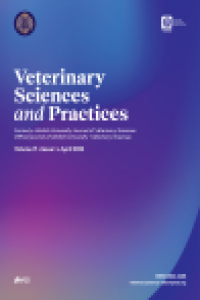Direkt ELISA ile Tanısı Konmuş, Enterotoksijenik E. coli (ETEC) K99+ ile Enfekte Manda Yavrularındaki (Malak) Bazı Klinikopatolojik Değişiklikler
Direkt ELISA, E. coli, Kan Gazları, , Klinik Patoloji, Manda Yavrusu (Malak)
Some Clinicopathological Some Clinicopathological Changes in Buffalo Calves Infected with Enterotoxigenic E. coli (ETEC) K99+ Detected by Direct ELISA in Buffalo Calves Infected with Enterotoxigenic E. coli (ETEC) K99+ Detected by Direct ELISA
Blood Gases, Buffalo Calves, Clinical Pathology, Direct ELISA, E. coli,
___
- 1. Radostits OM., Gay CC., Hinchcliff KW., Constable PD., 2007. Veterinary. Medicine. A text book of disease of cattle, sheep, pigs and horse 10th ed., Saunders Elsevier, Edinburgh, pp, 847-871. 2. Constable PD., Hinchcliff KW., Done SH., Grünberg W., 2017. Veterinary medicine: A textbook of the diseases of cattle, sheep, pigs, goats and horses. 11th ed. Vol. 2 Elsevier Health Sciences, pp, 1879-1899. 3. Kaper JB., Nataro JP., Mobley HL., 2004. Pathogenic Escherichia coli. Nat Rev Microbiol, 2, 123-140. 4. Hosein HI., Azzam RA., Abo-Elwafa M., Menshawy AMS., Rouby S., 2019. Virulence profile of enteropathogenic escherichia coli (epec) isolated from the cases of neonatal calf diarrhea. Adv Anim Vet Sci, 7, 755-760. 5. Acres SD., 1985. Enterotoxigenic Escherichia coli infections in newborn calves: a review. J Dairy Sci, 68, 229-235. 6. Hosein HI., 2018. Infectious Diseases of domestic animals. Text book, Fourth edition, Lazer center for publication and distribution, Beni Suef, Egypt. 7. Cho Y., Yoon KJ., 2014. An overview of calf diarrhea-infectious etiology,diagnosis, and intervention. J Vet Sci, 15, 1-17. 8. Rana N., Raut AA., Khurana SK., Manuja A., Saini A., 2012. Isolation and biotyping of Salmonella and Escherichia coli associated with neonatal buffalo calves. Indian J Anim Sci, 82, 676-678. 9. Bashahun GM., Amina A., 2017. Colibacillosis in calves: A review of literature. J Anim Sci Vet Med, 2, 62-71. 10. Niaz B., Khan AMT., Javed AH., Khalid MA., 2000. Hematological studies in induced buffalo neonatal calves diarrhea with enteropathogenic E. coli. Pakistan Vet J, 20, 85-89. 11. Ghanem MM., El-Fkhrany SF., Abd El-Raof YM., El-Attar HM., 2012. Clinical and haematobiochemical evaluation of diarrheic neonatal buffalo calves (Bubalas Bubalis) with reference to antioxidant changes. Benha Vet Med J, 23, 275-288. 12. Khan JA., Khan MS., Khan MA., Avais M., Maqbool A., Salman M., Rehman Z., 2009. Epidemiology of major bacterial and viral causes of diarrheoa in Buffalo calves in three districts of the Punjab province of Pakistan. Pakistan J Zool (Supplementary Series) 9, 187-193. 13. Sherwood D., Snodgrass DR., Lawson GHK., 1993. Prevalence of Escherichia coli in calves in Scotland and northern England. Vet Res, 113, 208-212. 14. Al-Mafraji AMR., 2009. Detection of E. coli K99 and Rota virus antigens in diarrheic and healthy buffalo of Babil Province, Iraq. Al-Anbar J Vet Sci, 7, 17-21. 15. Baxby D., Blundell N., Hart CA., 1984. The development and performance of a simple, sensitive method for the detection of Cryptosporidium oocysts in faeces. J Hyg, 93, 317-323. 16. Borriello G., Lucibelli MG., De Carlo E., Auriemma C., Cozza D., Ascione G., Scognamiglio F., Iovane G., Galiero G., 2012. Characterization of enterotoxigenic E. coli (ETEC), Shiga-toxin producing E. coli (STEC) and necrotoxigenic E. coli (NTEC) isolated from diarrhoeic Mediterranean water buffalo calves (Bubalusbubalis). Res Vet Sci, 93, 18-22. 17. Gruenberg W., 2016. Overview of Coli-septicemia. Merck Manual, 11th Edn. Merck Sharp & Dohme Corp. USA. 18. Srivani M., Reddy Y., Narasimha Subramanyam KV., Lakshman M., Kavitha KL., Ramanipushpa RN., 2019. Prevalence, molecular characterization and antimicrobial resistance of enterotoxigenic Escherichia coli in diarrhoeic buffalo calves. Indian J of Comp Microbiol Immunol Infect Dis, 40, 37-41. 19. Coles EH., 1986. Veterinary clinical pathology. 4th ed. Saunders Company, Philadelphia, pp, 203-240. 20. Shekhar S., Ranjan R., Singh CV., Kumar P., 2017. Prevalence, clinicohaemato-biochemical alterations in colibacillosis in neonatal calves. Int J Current Microbiol App Sci, 9, 3192-3198. 21. Bashir S., Ashraf I., Dar AM., Majid A., Bhat AA., Farooq J., 2015. Isolation and detection of Escherichia coli from diarrheic calves along with biochemical and hematologic parameters. J. Cell Tissue Res., 15,2,5059-61. 22. Malik S., Kumar A., Verma AK., Gupta MK., Sharma SD., Sharma AK., Rahal A., 2013.Haematological profile and blood chemistry in diarrhoeic calves affected with collibacillosis. J Anim Health Prod, 1, 10-14
- Başlangıç: 2022
- Yayıncı: Atatürk Üniversitesi
İsraa AL-ROBAİEE, Maab İbrahim AL-FARWACHİ
Diyabetik Sıçanlarda Yüzmenin Bazı Kan Parametreleri Üzerine Olumlu Etkisi
Nurcan DÖNMEZ, Ercan KESKİN, Mehmet ÖZSAN, Omer Mahruf ALİ SHOSHIN, Bekir MEHTAP
Sarcoptes ovis ile Enfekte Koyunlarda Serum Protein Fraksiyon Profili
Sedat ÇETİN, Ayşe USTA, Pınar EKİCİ, Semiha DEDE, Veysel YÜKSEK
Kedi ve Köpeklerde Sezaryen ve Piyometra Operasyonlarında Anestezi Teknikleri
Damla Tuğçe OKUR, Bülent POLAT
Korhan ÖZTURAN, Mustafa ATASEVER
Hasak Koyunlarının Akciğer Damarları Üzerine Makroanatomik Bir Çalışma
Zekeriya OZUDOGRU, Hatice ÖZDEMİR
Akış Sitometrisinin (Flow Cytometry) Sperma Kalite Analizlerinde Kullanımı
Koyun Tırnak Koroner Bölgesinin Histolojik İncelemesi ve Arteriyel Anastomozunun Yapısal Morfolojisi
